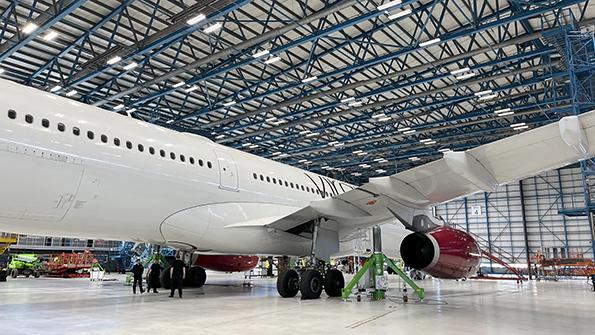
STS has taken more than 50 aircraft at Manchester, England, since the facility became operational last November.
Upon leasing the aircraft maintenance hangar formerly operated by defunct British leisure airline Thomas Cook at Manchester Airport, England, STS Aviation Services again set about restoring a UK MRO facility to its former importance. Its previous experience in doing this was in taking over the former Monarch Airlines-operated facility at Birmingham Airport in 2019, which it has since restored to a thriving operation employing hundreds of staff, with a 50-50 split between commercial base maintenance services (up to C checks) and a five-year project to convert Boeing 737 aircraft to Boeing E-7A Wedgetails for the Royal Air Force.
Restoring operations at Manchester after a period of inactivity is an altogether more difficult proposition, given the greater age of the facility compared to the more modern Birmingham hangar. To do this, STS invested in tooling for the Manchester facility, which, combined with Birmingham, runs into “several million pounds,” estimates Mick Adams, CEO for STS Aviation Services in the UK. However, he says some of the heavy tooling and equipment related to heavy checks for Airbus aircraft was redeployed from Birmingham to Manchester as the operation started up toward the end of 2022.
STS took its first aircraft in November, an Airbus A330, for a C check. Since then, as of March, more than 50 aircraft have had varying degrees of maintenance checks performed at the Manchester facility. “Subsequent to that it’s been nose-to-tail lines for operators, with the nature of the work being C checks, modifications and classic MRO activity,” Adams says. He admits that the level of maintenance activity to date has exceeded initial expectations, with much of the work coming from carriers operating out of Manchester Airport, looking to minimize costs and downtime.
While much of this work is related to Airbus narrowbody maintenance, STS is seeing strong demand for Airbus widebody MRO services at Manchester as well. “It’s a very limited market in terms of available capability,” says Ian Bartholomew, managing director of UK operations at STS Aviation Services, describing the Airbus widebody aftermarket. “We forecasted for a slower start but we’ve since accelerated well past that,” he adds. “But now we are managing expectations—we have a number of important customers and would like to provide as much work as they would like. We’re managing that throughput so we’re not overcommitting, but still providing a good level of service and delivery.”
Adams adds that all of the base maintenance workshop capability has been established since the opening, including more recently, approval by the UK Civil Aviation Authority for engine MRO work to commence at the facility. An additional certification from the European Union Aviation Safety Agency is expected in the early summer months. The approval for engine services was transferred from its facility in Newquay, England, which it acquired as part of its Apple Aviation buyout in 2019.
“As good as this was [engine services in Newquay], it wasn’t in the ideal location,” says Adams, who adds that the Newquay shop will continue to focus on narrowbody nose-to-tail work. “One of our motivations for taking the Manchester facility was the fact that it has a fantastic back shop and engine shop infrastructure.” The engine shop in Manchester has capacity for aircraft engine storage, inspection, repair and overhaul on several engine types, which Adams says will complement its existing in-field support for aircraft engines. “We’ve got full borescope capability and we plan to develop boroblending capability and our own nondestructive testing capability in the near future.”
As it stands, STS plans to conduct Airbus aircraft work in Manchester, while its Birmingham facility will service Boeing-manufactured aircraft. This plan is subject to change as operations continue to ramp up in the face of strong demand for services. Meanwhile, its facility in Newquay will continue to maintain Airbus narrowbody aircraft types. “We have to remain agile, and have the ability to be flexible and change,” Adams says. “During COVID, we learned only too well how we had to confidently reinvent ourselves. At the start-up phase of the Manchester facility, we don’t want to duplicate heavy capability across multiple locations, but that will change over time because the nature of the volume in Manchester is going to change over the next 18-24 months.”
Chief among these changes is a long-term agreement with U.S.-based cargo carrier Mammoth Freighters to undertake Boeing 777 passenger-to-freighter (P2F) conversion work in Manchester from 2024, including -200LR and -300ER variants. For this undertaking, along with booming maintenance demand activity, additional capacity and workforce additions will be sought. Adams sees the UK suffering from a lack of MRO capacity in general, a problem that has not been helped by the demise of several maintenance providers in the country over the past five years. This is a gap that STS and others have sought to address.
In terms of staff, Adams says the total number of employees at Manchester is “north of 100” and this figure will increase soon. “There will be a need to more than double that by the end of the year,” says Adams, who is buoyed by what he describes as a continuous stream of applications from technicians and engineers looking to work at the Manchester location.
The fundamentals for building this workforce have been based on solid foundations, Adams says, with numbers of ex-Thomas Cook maintenance staff returning to the site for the start-up of STS operations. “One of the great things about this facility is much of the team that has come together were here before with Thomas Cook, so that team camaraderie already existed, similarly to when we set up in Birmingham with a lot of former Monarch people.”
Adams is also seeing plenty of interest beyond just ex-Thomas Cook technical staff across the industry. “Recruiting an extra 100 people won’t be without its challenges, but I believe we will get there. More importantly, we have to consider what does that additional 100 people look like in terms of trainees, semiskilled cabin engineers, mechanics, technicians and support functions? It’s about getting that mix of people correct,” he says.
Supply chain issues that have affected the global industry over the past 18 months are not seriously impeding STS’ Europe operation, which in addition to the three UK base maintenance facilities includes multiple line stations. “For general types of maintenance material, we’re OK, as the market is pretty well sourced and supported by that,” Bartholomew says. However, he identifies more bespoke items used in typically more complex projects as presenting more challenges, and says STS is growing its inventory to support all areas of its operation.
